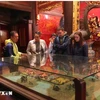More than 40 members of the Duong family in the southern province of Dong Thap 's Hoa An Commune have registered to donate their bodies to science after death.
While donating organs to scientific research is common around the world, it's still relatively unusual in Vietnam , where most people balk at donating their bodies to research due to beliefs of an afterlife.
Duong Van Tai said his family members had decided to donate their bodies to science by following the example of his father, Duong Tu Tin, who was the first person in the commune to have donated his body to scientific works.
Tai said his father was an active man who kept the habit of travelling by bike everyday until his death at the age of 80.
"One day, he suddenly expressed his intention to donate his body to scientific research and asked the rest of the family to find the relevant application form," said Tai.
"I thought it's just for fun but he said he wanted to be useful to society not only when he was alive, but also after his death."
Tai said his father died in 2007 after a heart attack.
"His body was sent to HCM City Medicine and Pharmacy University immediately," said Tai, adding that many families in the area were against their family members donating body parts to scientific research.
"But in our commune it was supported by local authorities and residents, so it's easy for me to turn my father's wish into reality," he said.
His mother, Phan Thi Man, died last month. She had previously wanted to be buried in the garden where her children and grandchildren could visit and burn incense. But she changed her mind after her husband's death.
Do Thanh Nhan, who led the university's group to receive the bodies of Tin and Man, said the donation had helped his university's students better understand techniques and theories they learned from books.
"We are really moved and fired by the sacrifice of such people. They play an important role in contributing to the development of the country's medical sector," said Nhan.
"After completing the research on the bodies, we incinerate them and send the ashes to the family or a pagoda."
Tai said he worshipped his parents with their portraits on the altar. He said he encouraged his family members and friends to donate their bodies to scientific research because it played an important role in medical development.-VNA
While donating organs to scientific research is common around the world, it's still relatively unusual in Vietnam , where most people balk at donating their bodies to research due to beliefs of an afterlife.
Duong Van Tai said his family members had decided to donate their bodies to science by following the example of his father, Duong Tu Tin, who was the first person in the commune to have donated his body to scientific works.
Tai said his father was an active man who kept the habit of travelling by bike everyday until his death at the age of 80.
"One day, he suddenly expressed his intention to donate his body to scientific research and asked the rest of the family to find the relevant application form," said Tai.
"I thought it's just for fun but he said he wanted to be useful to society not only when he was alive, but also after his death."
Tai said his father died in 2007 after a heart attack.
"His body was sent to HCM City Medicine and Pharmacy University immediately," said Tai, adding that many families in the area were against their family members donating body parts to scientific research.
"But in our commune it was supported by local authorities and residents, so it's easy for me to turn my father's wish into reality," he said.
His mother, Phan Thi Man, died last month. She had previously wanted to be buried in the garden where her children and grandchildren could visit and burn incense. But she changed her mind after her husband's death.
Do Thanh Nhan, who led the university's group to receive the bodies of Tin and Man, said the donation had helped his university's students better understand techniques and theories they learned from books.
"We are really moved and fired by the sacrifice of such people. They play an important role in contributing to the development of the country's medical sector," said Nhan.
"After completing the research on the bodies, we incinerate them and send the ashes to the family or a pagoda."
Tai said he worshipped his parents with their portraits on the altar. He said he encouraged his family members and friends to donate their bodies to scientific research because it played an important role in medical development.-VNA



















